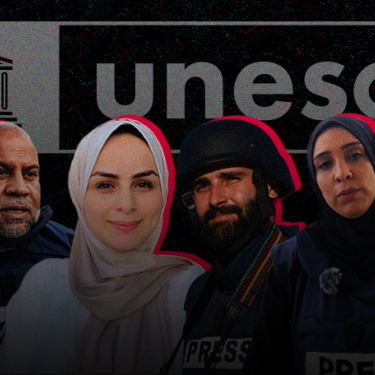RSF nominates Palestinian journalists in Gaza for UNESCO’s Guillermo Cano prize

Reporters Without Borders (RSF) is nominating Palestinian journalists in Gaza for this year’s UNESCO/Guillermo Cano World Press Freedom Prize. To pay tribute to the exceptional work of Gaza’s reporters since 7 October, RSF urges UNESCO to award the prize to four Gazan journalists – Wael Dahdouh, Aseel Mousa, Ola Al Zaanoun and Motaz Azaiza – on behalf of all their colleagues.
Awarded annually since 1997 to a person or organisation that makes an outstanding contribution to the defence or promotion of press freedom, especially in the face of danger, the Guillermo Cano Prize should be given this year to the Palestinian journalists who have been telling the world about the continuing tragedy in Gaza since the war began on 7 October, RSF says.
To be awarded in the Chilean capital, Santiago, on 2 May to mark World Press Freedom Day, this year’s prize would have very deserving recipients with four Palestinian journalists who have exemplified courage, determination and self-sacrifice. They are Wael Dahdouh, the Al-Jazeera TV news channel’s Gaza bureau chief, Aseel Mousa, a freelance reporter, Ola Al Zaanoun, a journalist who has been RSF’s correspondent in the Gaza Strip since 2018, and Motaz Azaiza, a freelance reporter and photographer.
Without them and their colleagues on the ground in a territory that has been totally isolated since 7 October, the Gaza Strip would have been a news black hole, totally abandoned to a communication war between Israel and Hamas.
“The last bastions of journalism in Gaza are in danger of being snuffed out amid a deafening silence from the international community and the UN Security Council, which is unable to enforce its own resolutions on the safety of journalists in times of war. By nominating Palestinian journalists in Gaza in the persons of Wael Dahdouh, Aseel Mousa, Ola Al Zaanoun and Motaz Azaiza for the Guillermo Cano Prize, we are sending an alert to UNESCO: Gazan journalists are giving their lives for the right to information. They must be supported, they must be protected, and they must be honoured.
At least 86 journalists have been killed in Gaza since 7 October, including at least 21 in the course of their work or because of their work, according to the information so far gathered by RSF. Because of this heavy toll, synonymous with the eradication of Palestinian journalism and the right to information in Gaza, RSF has filed two complaints with the International Criminal Court. In a sign of the gravity of the situation, the ICC prosecutor confirmed that, on the basis of RSF’s complaints, he has included crimes against journalists in his investigation.
Four iconic Gazan journalists
Wael Dahdouh
Al-Jazeera’s Gaza bureau chief, Wael Dahdouh is a veteran Palestinian journalist. A leading example of resilience and the defence of journalistic freedom, he never stopped reporting the news, despite losing his loved-ones. He has lost his wife, his grandson and three of his children, including one who was himself an Al-Jazeera reporter. All were killed by Israeli strikes in the Gaza Strip. Displaced from their home, his wife and their three children found refuge in the Nuseirat camp, where they fell victim to an Israeli bombardment. After being Injured by yet another Israeli drone strike in December that killed his cameraman, Samir Abu Daqqa, Dahdouh managed to travel to Qatar on 16 January to receive medical treatment.
Aseel Mousa
A Palestinian freelancer, Aseel Mousa continues to be based in Gaza, where she is still covering the Israeli offensive. As one of the last journalists still there, she provides vital testimony about what the Gaza Strip’s population is undergoing. In particular, she has been reporting what it is like for patients, including pregnant women, in the few hospitals still standing. Her work has been published by many international media outlets, including The Guardian, Middle East Eye, The Intercept and Al Jazeera.
Ola Al Zaanoun
RSF’s correspondent in the Gaza Strip since 2018, Ola Al Zaanoun was forced to leave her home in the north of the territory by an Israeli army evacuation order. Together with her husband, Agence France-Presse correspondent Adel Al Zaanoun, and their twin children, she sought refuge in the southern city of Khan Yunis on 13 October. Wounded in the leg while fleeing an Israeli strike on 24 October, she was admitted to the Nasser Hospital in Khan Yunis for treatment.
Motaz Azaiza
A prominent member of a new generation of young Palestinian journalists with a sizable social media presence, Motaz Azaiza has had nearly 18 million followers of his coverage of the war on Instagram. A freelance photographer and translator before 7 October, he is one of the young, connected Palestinians who – like two women, Plestia Alaqad and Bisan Owda – have been turned into journalists by the war, documenting its evolution day by day. This 24-year-old photojournalist, who lost 15 of his loved ones in an Israeli strike in mid-October, received death threats and was subjected to great deal of pressure. After covering the barbarity of the Israeli offensive against Gaza for 108 days, he finally left for Qatar on 23 January.
UNESCO’s press freedom prize is named after Guillermo Cano Isaza, a Colombian newspaper editor murdered in 1986.
